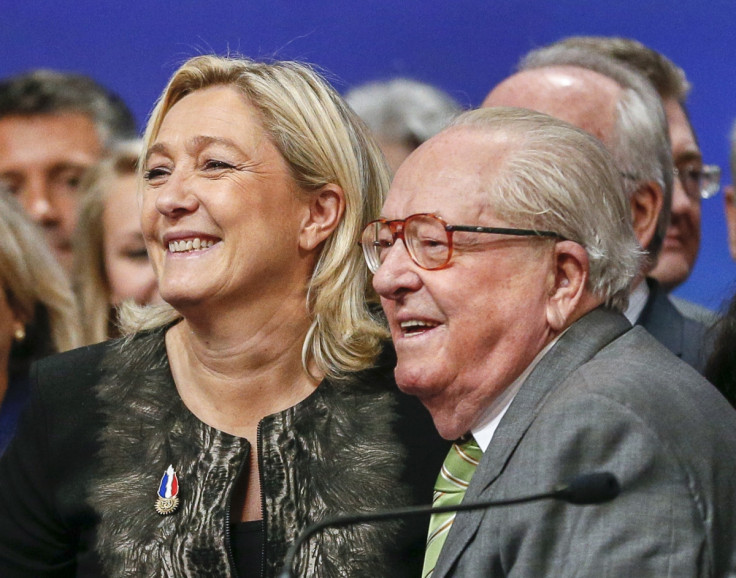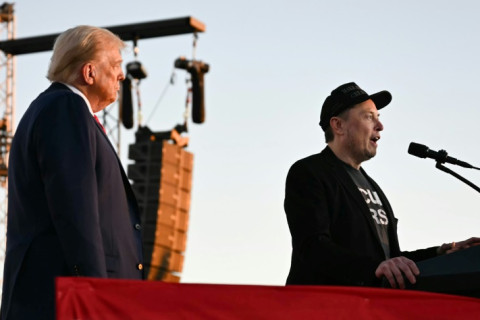The last thing the world needs now is Marine Le Pen leading France
Anti-establishment, anti-immigration politics flourish around the world but liberals remain shocked.
After Brexit and Donald Trump, perhaps the last thing we need is Marine Le Pen as the next French president. What would happen to Europe then? Europe not as a place, but as an ideal?
After Marine Le Pen tweeted her congratulations to Donald Trump on his election victory: "Congratulations to the new President of the US, Donald Trump, and the American people – free!" Florian Philippot, Front National party's vice president, tweeted a photo of Ms Le Pen with the caption: "Their world is collapsing. Ours is being built."
With Le Pen junior – hardly any more moderate than her father Jean-Marie – the famous "Lepénisation des esprits" or lepénisation of the mind has gained renewed vigour, influencing mainstream politics ever more since she took charge of the far-right National Front.
With her at the helm of l'Hexagone, Euroscepticism would finally catch on everywhere, especially in some Mediterranean countries where Brexit is still taken lightly and perceived as a manifestation of British oddities and not a symptom of a global malaise.
Spain has been virtually immune to Euroscepticism. Europe is still seen as a byword for hope, particularly among the young; and to some extent, this is still true for Portugal and Cyprus, and anywhere south of the Alps.
With François Hollande rating very badly in the opinion polls and Nicolas Sarkozy seen by many as part of an oppressive establishment incapable of renewing itself, Le Pen has a serious chance of winning. She could definitely steal the show – à la Trump.
But wait. What about the imminent Austrian presidential elections? True, the president there isn't as important on the worldwide stage as in France or the States, but a representative of the far-right sitting in the regal Viennese Hofburg would send a shiver down the spines of many. Austrian presidential candidate Norbert Hofer's endorsement of his country's proposal to build a wall across the border with Italy to stem the flow of economic migrants smacks of Europe's darkest discriminatory practices, those which the forebears of his rival Alexander Van der Bellen escaped from 75 years ago. (Van der Bellen's family, of remote Dutch origin, fled Estonia after the annexation by the Soviet Union.)
Le Pen and Hofer may well meet with the new US president next year. Even though Trump didn't seem to cut it as a statesman, he was still a mainstream candidate and always stood a good chance. Yet, the result has shocked most of us. The Brexit outcome proved that centrist consensus has most spectacularly shifted, but Trump's arrival in the White House still blind-sighted many. So, let's stop being in denial, even if electoral support for both Hillary Clinton and Remain was very robust: Democrats and pro-EU Brits lost by a small margin.
Various respectable pundits are saying Trump's ludicrous pledges won't materialise. This, surely, is the same complacency that allowed Trump to rise so far: deep down, we are so convinced of the existence of a liberal consensus that we don't believe people actually mean what they say.

Trump, Farage, Wilders et al are not simply "trolls". They've grasped the sense of detachment many feel in our post-industrial societies, where technology overarches all aspects of production of whatever kind, leading to job losses and a highly specialised workforce that excludes the many who can't afford to update their skills. The British scholar Guy Standing is an expert on this. His book The Precariat (Bloomsbury Academic, 2011) broke through despite being published in the academic press as finally someone was highlighting the plight of millions who find themselves in this situation.
Such frustration is well known: from xenophobic Matteo Salvini (Italy's Northern League) to Islam-basher Geert Wilders (the Dutch Party of Freedom), via Europhobe Frauke Petry (Alternative for Germany) and even global characters like Vladimir Putin, Recep Tayyip Erdoğan and Rodrigo Duterte with his venomous remarks on Barack Obama, the political leaders of many parts of world are harnessing the fear of the future that hundreds of millions of voters harbour. But this is no excuse to let them talk the way they do.
Trump may not have political experience, but he's definitely using state-of-the-art communication techniques.
War-torn countries and the unutterable misery plaguing them – even successful athletes have had to depart from Libya on board unseaworthy boats – deserve a lot more respect. Instead, the unfortunate people fleeing to Europe (although many thousands die en route every year) are used as fodder for electoral gain. Immigrants are much maligned.
They are, by and large, numerically irrelevant. This has to be emphasised for their sake and to take away ammunition from those leaders who say it is they who represent the underprivileged. All they want is power and skilfully resort to any tactic to get it. Trump may not have political experience, but he's definitely using future savvy communication techniques.
Trump-fan Berlusconi did the same in the early 1990s: he portrayed himself as an anti-establishment face after the humongous corruption scandals of the time. Outré statements is what worked back then and even more today, as naff as they may sound to liberal ears – but they have superior, inbuilt dog-whistle qualities to them. Sadiq Khan found the right language against them, but not all politicians, however principled they are, have his verbal skills. Progressives need to be cheekier in a way, just as the London mayor managed to rebuff many negative comments, including those about his height (from Robert Peston on the weekly ITV show), with sagacity.
So yes, perhaps we should view Le Pen as president (she'd be a key figure at the UN security council, NATO and G7 summits too) as a resounding slap in the face, right on our doorstep, to wake us all up, smell the xenophobic coffee making our lives a dash more brutish and cynical as days go past, and fight back − as articulately as we can.
Alessio Colonnelli is a freelance journalist who has written for Open Democracy, The Independent, Foreign Policy and Politico Europe
© Copyright IBTimes 2024. All rights reserved.







